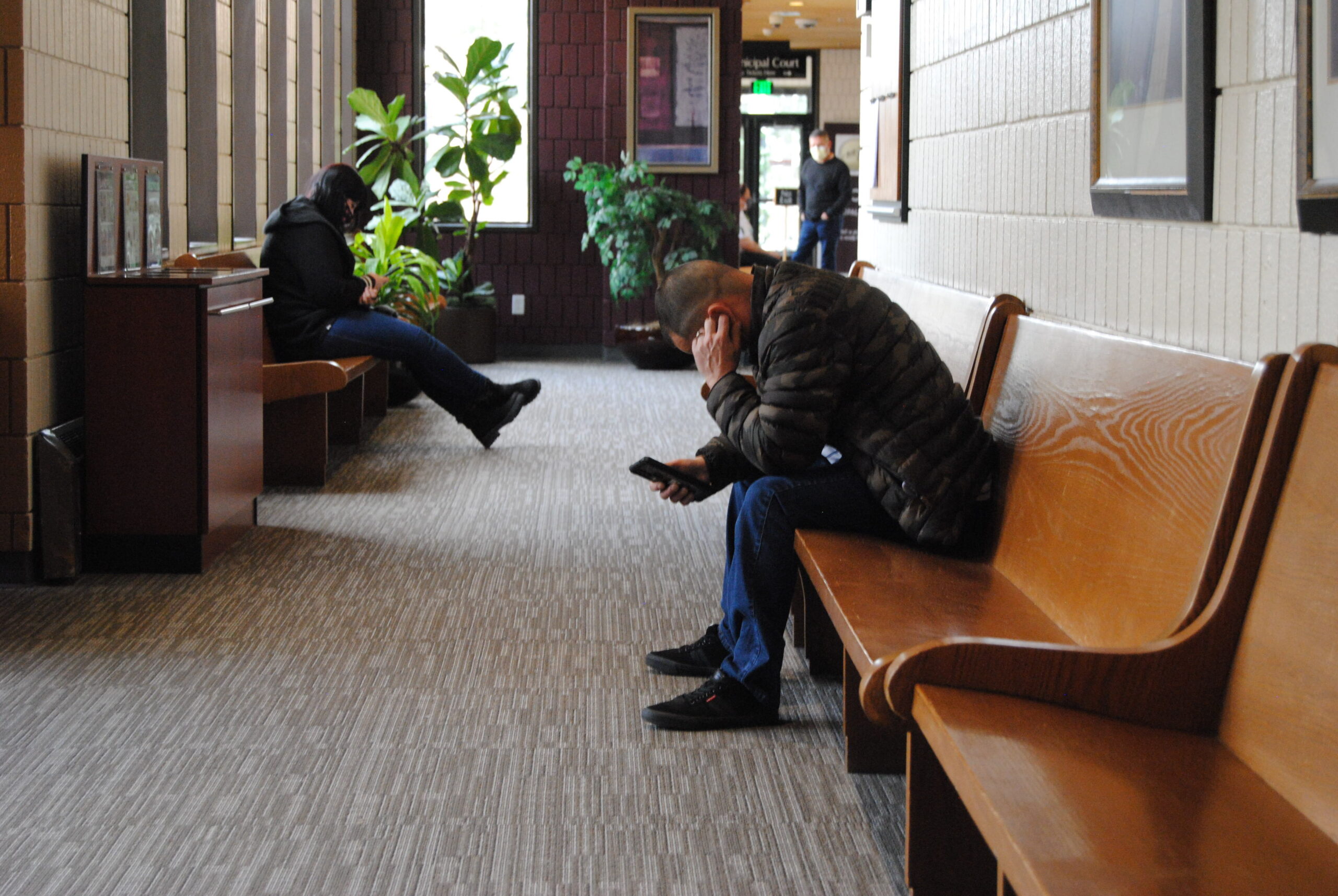
On a December morning at the Boulder County Justice Center, tenants waited hours to appear in eviction court. More than two dozen cases crowded the day’s docket.
The stress of waiting, and potential eviction, pounded through Jovani’s head as he sat outside courtroom C. The 38-year-old was supposed to be at work, but leaving before he appeared in front of the judge meant he would almost certainly lose his case — and his home.
He texted his boss that he would be late.
“This is such a headache,” Jovani told CPR. He asked to only be identified by first name out of fear of losing his housing.
“My wife, she’s currently pregnant,” he said. “We definitely don’t want to be homeless.”
Jovani's case is part of a surge of evictions filling courts in Boulder and other Colorado counties recently. Landlords across the state filed 3,237 cases in December, the highest monthly total since February 2020, before the start of the pandemic here, according to state data.
Outside of the same courtroom, Alex sat with her partner, Joel Zavala, and their newborn baby. She too asked to only be identified by first name out of fear of losing their housing.
The couple fell behind on rent at their Longmont apartment in November due to job loss and a family loan that fell through. Towards the end of the month, their landlord posted a 10-day demand on their door.
They tried to make partial payment in response, Alex said. She then tried to pay the full amount on the 23rd, but the landlord didn’t accept it.
Showing up to court was their last effort to keep an eviction off their record.
“We’ve never been in this situation before and don’t really know what to expect,” she said. “It’s really frustrating.”
Pandemic protections are gone, but renters' struggles linger
The surge has been less dramatic than the “tsunami” some advocates predicted would flood local courtrooms after the United States Supreme Court blocked an extension of the Centers for Disease Control and Prevention’s eviction moratorium in August. But it still has led to a surge of people in the state losing the places they call home, said Thom Ward, a Boulder-based attorney who represents tenants.
“Almost all of our recent cases have been failure to pay rent,” Ward said. “That’s the reason people are being evicted right now.”
Renters who spoke to CPR say they are still recovering from financial blows such as job loss or debt accrued over the past two years. Rent prices have also risen sharply in most Colorado communities, squeezing lower-income residents.
Jovani’s troubles started after he lost his job in telecommunications earlier this year. He got a new job with a solar power company in Boulder, but, he said, it pays only about half of what he used to make.
“I’ve tried to work with the landlord,” Jovani said. “They just want the full amount or they want me gone, I guess.”
He currently owes about $4,300 in back rent on his Longmont apartment. He’s also paying a wage garnishment from another debt that has cut into his income.
His landlord, Advenir Living, an out-of-state Miami-based real estate and property management company, declined an interview request. In a phone call, a staff member said the company doesn’t comment on specific tenant cases and treats all renters equally in compliance with state laws.
Forcible Entry and Detainer (FED) filings aren’t an indication of actual evictions. Rather, they represent the number of times Colorado landlords have tried to initiate an eviction, before sheriff’s deputies forcibly remove a tenant from their home. The complex legal process involves multiple steps and can take weeks or even months to move through court.
Not all, but many FED filings do eventually lead to a forced move-out, especially if tenants don’t show up to their court date to argue the case.
When the pandemic first began, eviction moratoriums led FEDs to drop to historic lows in Colorado and other states. Fewer than 200 eviction cases were filed across the state in April 2020.
Those numbers remained low through most of the pandemic until the moratorium went away. But now, Denver County’s eviction numbers have been steadily increasing since August 2021, reaching 79 percent of 2019 levels in November.
Many Colorado landlords see the current upward creep as an indication of a return to pre-pandemic norms. Before COVID, the state usually saw around 36,000 to 50,000 eviction filings per year, according to the Colorado Apartment Association, the state’s largest trade group of landlords.
“Eviction filings are still not totally back to normal, healthy pre-pandemic levels,” said Drew Hamrick, senior vice president and general counsel for CAA. “The very slow and steady return of our housing markets to normality is very good news.”
It shows that the housing market is restabilizing after a turbulent period without the tsunami of eviction cases that many feared, Hamrick said. Evictions are a rare, but necessary, part of the business, he added.
“In order to encourage people to loan housing units to other people, you have to have a reasonable way to get a property back (if tenants can’t pay),” Hamrick said. “Otherwise, there’s no units to lend.”
Rental assistance programs stretched by demand
The spike, meanwhile, has led to more demand for assistance programs organized to help renters stay housed during the pandemic.
Colorado’s Emergency Rental Assistance Program saw application numbers hit 4,700 in November, a 33 percent jump over the program’s monthly average.
Local programs have felt the rush too. Staff at the city of Boulder’s assistance program have seen the number of weekly applications rise almost 50 percent over the past several months. (This story was reported before the catastrophic Marshall fire on Dec. 3o, 2021.)
The influx has made processing times longer. It now takes about a month to approve a typical application, said Jason Allen, a program coordinator.
“Everyone’s working extremely hard,” Allen said. “We’ve seen some really heroic work from people to try and prevent (evictions) from happening.”
The city has also provided over 100 renters with free legal representation in court since January 2021, a new service approved by voters during the 2020 general election.
Ward, the Boulder attorney, said he’s been able to help many tenants negotiate an early move-out and avoid getting an eviction on their record. But without the CDC’s moratorium, there’s typically no route to helping renters stay housed if they can’t pay.
“Landlords can’t be forced to work with tenants who can’t pay,” Ward said. “The single thing that would make the greatest difference is if someone with rental assistance funds could be physically present and able to write checks at every eviction court date.”
Many renters never even show up to court, Ward said, which means they receive a default judgment against them.
“It’s very concerning to me,” Ward said. “Aside from the individual harm, there’s a ripple effect on families and employers who might have otherwise employed these individuals if they had housing.”
Hope at the courthouse
Renters who do make it to their court hearings have a much better chance of avoiding getting an eviction on their record, which can make it easier to secure new housing in the future.
Couple Alex and Joel showed up after accepting free legal aid from the city, which resulted in them getting 10 days to move out of their Longmont apartment. If they left, their case would be sealed from public record.
“I believe they were as reasonable as they could be. They could have given us 36 hours, but they gave us 10 days,” said Alex.
They started looking for a new place to live before they came to court. But they may have to stay with family for a while while they fill out applications for new apartments and pay back debt.
“Can’t be too safe,” she said. “We have some plans for a backup.”
After waiting almost 3 hours, Jovani, the Longmont renter, finally got his turn in front of the judge. He showed proof that he had applied for rental assistance through the state’s ERAP program.
He also worked with Ward, the attorney, who was able to negotiate on his behalf with the landlord.
The two sides struck a deal — if Jovani’s rental assistance money came through, he could remain in his current apartment.
The judge would meet with them again in early January. If the rent was paid back before then, he said, the case would be dismissed.
Jovani left the courtroom in a rush to get back to work.
“I hope this is the end of this,” he said. “I’m ready to move on.”
Resources for people struggling to pay rent in Colorado:
- Colorado’s Emergency Rental Assistance Program (ERAP) can help tenants who have been unable to pay rent due to financial hardship caused by COVID-19. ERAP can help cover rent as far back as April 2020.
- Boulder’s Eviction Prevention and Rental Assistance Services (EPRAS) program is available to renters in Boulder and surrounding communities.









